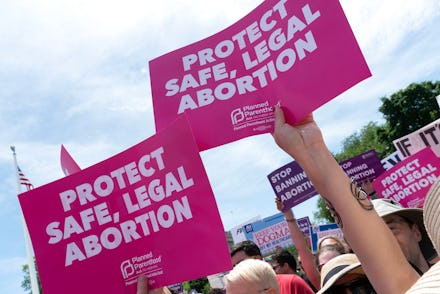The ACLU is suing 7 Texas cities that are trying to skirt federal abortion law

With the anti-abortion movement emboldened under President Trump, conservative politicians are coming up with audacious labels for themselves. Anti-abortion proponents have always claimed rather to be "pro-life," but now it appears they've gone a step further. On Tuesday, the ACLU announced it is suing seven Texas towns calling themselves "sanctuary cities for the unborn" in an effort to enshrine anti-abortion rules.
Scattered throughout eastern Texas, the towns take inspiration from the city of Waskom. In June 2019, Waskom's city council, made up entirely of white men, passed an ordinance to ban abortion despite there being no clinics in the town anyway. Six other towns followed with their own anti-abortion ordinances: Naples, Joaquin, Tenaha, Rusk, Gary, and Wells.
Here's the thing: Individual towns cannot up and ban abortion. Not only does it go against Texas state law, but it's also a blatant violation of federal law, too; despite pushes from Republican legislators and concerns regarding a Louisiana Supreme Court case, Roe v. Wade is still law of the land.
In response, the ACLU and ACLU of Texas sued the seven towns on behalf of Lilith Fund and Texas Equal Access Fund. Both of these are abortion rights advocacy groups, but neither provide abortions themselves. Still, the ACLU stated that the "sanctuary city" ordinances labeled the groups as "criminal organizations."
“These ordinances are unconstitutional,” Anjali Salvador, a staff attorney for the ACLU of Texas, said in a statement. “Abortion is legal in every state and city in the country. Cities cannot punish pro-abortion organizations for carrying out their important work — especially when they do so in a way that violates the First Amendment.”
By using the label "criminal organizations," the ordinances prohibit the Lilith Fund and the Texas Equal Access Fund from "establishing a physical presence of any sort," according to the lawsuit. They're also banned from providing any sort of services.
This means that the issue isn't only about Roe v. Wade or the legality of abortion. According to the ACLU, the ordinances violate each group's rights to free expression and association as outlined in the First Amendment, and the "criminal organization" designation "illegally impose[s] punishment without a fair trial."
“A major part of our work is to make sure every Texan knows their rights and can find legitimate, fact-based information about getting an abortion – regardless of income or zip code," said Amanda Beatriz Williams, the executive director of Lilith Fund. "These would-be abortion bans are deliberately designed to confuse people about their rights and push safe abortion care further out of reach."
Watching anti-abortion proponents co-opt language tied to immigration is difficult. But given that Trump became the first sitting president to attend the March for Life this year, it's likely that the anti-abortion movement will grow even more bold.